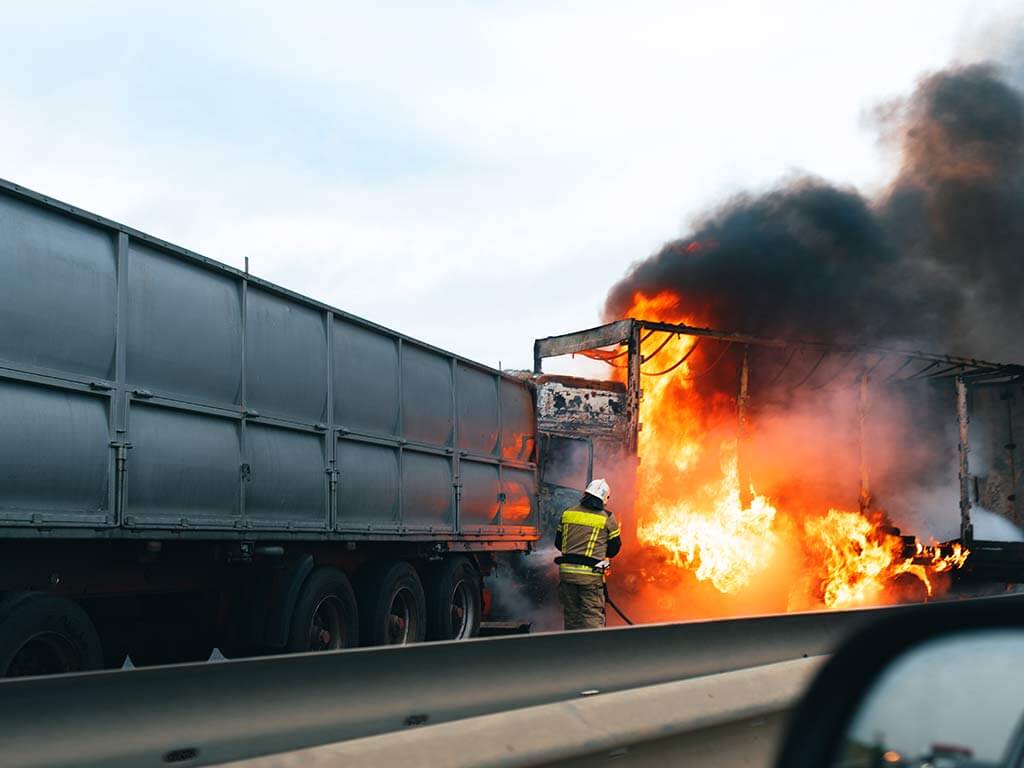
The dedicated legal team of Caputo & Mariotti
Navigating Truck Accident Lawsuits: From Trial Preparation to Verdict
June 27, 2024
Understanding the Lawsuit Process
Truck accident lawsuits represent a complex legal challenge, often requiring detailed knowledge of both trucking regulations and personal injury law. Understanding the lawsuit process begins with recognizing the importance of filing an accurate and comprehensive complaint, which sets the stage for all subsequent legal proceedings. This complaint must outline the plaintiff’s allegations clearly, detailing the injuries and damages suffered. In this context, exploring our guide on damages in vehicle accident lawsuits can provide further insights into the types of compensation available. Filing the lawsuit initiates a formal legal action, typically in the jurisdiction where the accident occurred, ensuring that the plaintiff’s claims are heard in the proper venue. This process involves strategic decisions, such as choosing the right court and identifying all liable parties, which can include both the truck driver and the trucking company. Understanding these nuances is critical, as it can significantly impact the outcome of the case.
Key Steps in Trial Preparation
Preparing for trial in a truck accident lawsuit involves meticulous planning and strategic foresight. This phase begins with gathering all necessary evidence, including accident reports, medical records, and witness testimonies. The discovery process is essential here, as it allows both parties to exchange relevant information and documents. Our page on heavy trucking accidents offers valuable context on gathering evidence and understanding trucking regulations. Effective trial preparation also involves selecting a competent legal team experienced in personal injury and trucking laws. Ensuring that all procedural requirements are met, such as filing motions to compel or motions in limine, can prevent delays and strengthen the plaintiff’s case. Additionally, pre-trial motions and hearings are critical in resolving any disputes over admissible evidence, ultimately shaping the trial’s direction.
The Role of Expert Witnesses
Expert witnesses play a pivotal role in truck accident lawsuits by providing specialized knowledge and opinions that are crucial for establishing liability and damages. These experts, who may include accident reconstructionists, medical professionals, and economists, help clarify complex issues for the jury. For instance, an accident reconstructionist can explain the dynamics of the collision, while a medical expert can detail the extent of the plaintiff’s injuries. Our article on tractor-trailer ahttps://caputomariotti.com/understanding-tractor-trailer-accidents/ccidents further delves into the technical aspects that experts might elucidate. The selection and presentation of expert witnesses require careful consideration, as their credibility and testimony can have significant implications on the case’s outcome. Preparing these witnesses for deposition and trial involves thorough briefings and mock examinations to ensure they convey their findings effectively and withstand cross-examination.
Trial and Verdict Dynamics
The trial phase in a truck accident lawsuit is where the gathered evidence and prepared arguments are presented before a judge or jury. This stage demands precision and clarity from the legal team, with opening statements setting the narrative and witness testimonies building the case’s foundation. Understanding jury dynamics and tailoring arguments to resonate with them are crucial for influencing the verdict. Our resource on trucking accident causes can provide additional context for crafting persuasive arguments. During the trial, both parties present their cases, with the plaintiff’s team bearing the burden of proof. Cross-examinations challenge the credibility of testimonies, while closing arguments summarize the case, emphasizing key evidence and urging a favorable verdict. The jury’s deliberation process follows, where they weigh the evidence and reach a verdict based on the preponderance of the evidence.
Post-Trial Motions and Appeals
After a verdict is reached, the legal process does not necessarily conclude. Post-trial motions can significantly alter the outcome by requesting the court to amend the verdict or grant a new trial. Common motions include those for judgment notwithstanding the verdict, which argue that the jury’s decision was not supported by the evidence. Understanding these legal nuances is essential for anyone navigating the complexities of truck accident litigation. For further insights into complex litigation processes, consider our overview of commercial litigation. Additionally, the appeals process offers another avenue for challenging a verdict, though it involves a higher standard of review. Success in appeals often hinges on demonstrating legal errors that affected the trial’s fairness or outcome. Engaging experienced appellate counsel is crucial for effectively navigating this challenging phase.
Take the Next Step with Caputo & Mariotti
Navigating a truck accident lawsuit, from filing the initial complaint to trial, verdict, and potential appeals, requires deep legal knowledge, strategic precision, and strong advocacy. Each phase involves important decisions that can directly impact your ability to recover full and fair compensation for your injuries, losses, and future needs. Without experienced legal guidance, even a strong case can be put at risk.
If you or a loved one has been injured in a truck accident, you do not have to handle this complex process alone. Caputo & Mariotti has the experience, resources, and commitment necessary to protect your rights and pursue the results you deserve. Contact Caputo & Mariotti today for a free confidential consultation and take the first step toward holding negligent parties accountable and securing the compensation you are entitled to.
FAQs
Q1: What is the first step in a truck accident lawsuit?
A: The first step is filing a complaint, which formally initiates the legal proceedings by outlining the plaintiff’s allegations and damages.
Q2: How important are expert witnesses in these cases?
A: Expert witnesses are crucial as they provide specialized knowledge that helps clarify complex issues for the jury, influencing the case’s outcome.
Q3: Can a verdict be changed after the trial?
A: Yes, post-trial motions can request the court to amend the verdict or grant a new trial if significant legal errors are identified.
Q4: What role does discovery play in trial preparation?
A: Discovery is vital for exchanging relevant information between parties, allowing for a thorough preparation and strengthening the case.

